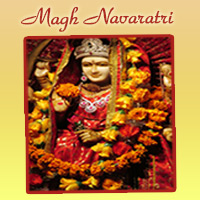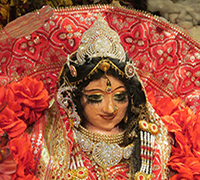Navaratri is a festival dedicated to the worship of the Goddess. The word “nava” means nine and “ratri” means night, so Navaratri literally means “nine nights.”
During these nine nights and ten days, the various forms of Devi are worshiped. The tenth day, known as Vijayadashami, symbolizes the day of victory – the victory of good over evil.
Navaratri, which may also be referred to as Navratri, Navarathri, and Navrathri, is celebrated four times a year at the Devi Mandir and the specific dates of each festival are determined according to the lunar calendar.
Winter Navaratri is observed during the Shukla Paksha (waxing phase of moon) in the month of Magh (January-February). In 2015, the dates we celebrate are January 20th through January 28th.
The Special Significance of Magh Navaratri
The nine days of Magh Navaratri are extremely auspicious for the spiritual sadhaka (aspirant). Shree Maa and Swami Satyananda Saraswati encourage us to become more introspective and to purify ourselves by making a commitment, or sankalpa, to performing sadhana during this time.
Make a sankalpa for Navaratri and pray to the Divine Mother to alleviate obstacles, difficulties, sorrow, and problems.
Traditional Worship of the Goddess
Navaratri celebrations are traditionally divided into three sets of three days each dedicated respectively to Maha Kali, Maha Lakshmi, and Maha Saraswati:
-
-
- First Three Days: The Goddess is celebrated as Kali, She Who Takes away Darkness. This is meant to destroy all of our negative tendencies.
Learn to worship Goddess Kali by performing the Kali Puja (also available as Kali iPad App).
Also, you can listen to Shree Maa’s recitation of the Thousand Names of Kali, the Kali Sahasranam.
- First Three Days: The Goddess is celebrated as Kali, She Who Takes away Darkness. This is meant to destroy all of our negative tendencies.
-
-
-
- Second Three Days: Devi’s form is celebrated as Maha Lakshmi, the Goddess who grants an abundance of wealth, including spiritual wealth.Obtain Maha Lakshmi’s grace by performing the Lakshmi Puja (also available as Lakshmi iPad App).
-
-
-
- Final Three Days: The Goddess is worshiped as Saraswati, the Goddess of Wisdom. Saraswati bestows success in all aspects of life.The Saraswati Puja Book is a great resource to learn how to Worship Saraswati Devi.
-
Worship Practices at the Devi Mandir
Swami Satyananda Saraswati has explained that these scriptural texts present a complete system for worship in the Shakti tradition.
Learn more – watch Shree Maa and Swamiji’s Chandi Path Video Class and Cosmic Puja Video Class.
Other Navaratri Traditions at the Devi Mandir
At the Devi Mandir, during the nine days and nights, we try to our capacity to put our worldly responsibilities on hold. We try to spend as much time in the temple as we are capable and to focus ourselves on spiritual practices dedicated to the Goddess.
Often during Navaratri, devotees observe some form of a fast. While the fast is defined by the devotee’s intention and capabilities, it can be observed from the first day through the evening of the eighth day. After performing Annapurna Puja, devotees break the fast with a feast in celebration.
Everyone can define the fast according to his or her own necessities. Some people confine to milk and fruits during this time, avoiding meat, fish, eggs, alcoholic drinks, grains, onion and garlic. Others fast only on vegetables. Each individual will fast according to his or her own desire and capacity.
Join Us!
Join us on live webcam for the following events:
-
-
- Saturday, January 24th, Special Kirtan at 6:00 PM
- Sunday, January 25th, Chandi Path Recitation at 9:30 AM
- Tuesday, January 27th, Annapurna Puja at 6:00 PM
-
Learn more about how to worship Goddess Durga, Goddess Kali, Maha Lakshmi, Goddess Annapurna, and Mother Saraswati in Ways to Worship! Also, browse through these Navaratri Questions for Swamiji’s advice on Navaratri.
Have a Blessed Navaratri!
Jai Maa!

